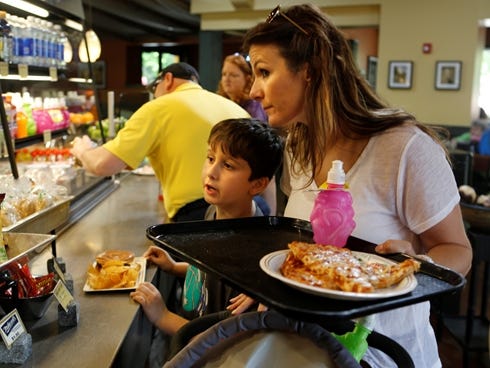
The zoo's Base Camp Cafe has just been certified by the Green Restaurant Association with four stars, its highest rating. Only 15 restaurants in the nation have achieved that distinction, and none with as many points as Base Camp received.
"It demonstrates that the world's not going to be saved by some magic wand waved by a large organization; it will be saved by hundreds of million better decisions made every day," zoo Director Thane Maynard said Thursday.
Michael Oshman, CEO and founder of the Green Restaurant Association, called the distinction a "phenomenal" achievement. "They have set a new benchmark that will serve as a model and create a nice incentive for other restaurants to hit."
Base Camp opened for the 2013 season after a remodel and retrofit. Like the rest of the zoo, it gets a quarter of its power from the zoo's solar electricity array. Kitchen equipment includes a variable-power ventilating hood that's 60 percent more efficient than most.
"Restaurants are huge energy hogs," said Mark Fisher, the zoo's director of sustainability. "It's also where you can get your money back."
He estimates the zoo spent $2.5 million to improve the restaurant, including $30,000 just to achieve green goals.
"Our projection is that it will save us about $10,000 yearly, so it will be paid back in three years," Fisher said.
Food is served in containers that can be composted along with food waste. There is a full recycling program, in the dining room and in the kitchen. The restaurant even changed its pest-control company to one with a green certification.
And in several creative ways, the cafe is increasing the amount of food that's locally grown. That includes leasing zoo-owned farmland in Mason to Green Bean Delivery, which then grows and supplies the zoo with organically grown produce. Green Bean Delivery also is a source for local foods from other area farms.A greenhouse just outside the restaurant's doors will provide year-round fresh vegetables â?? even fish, once an aquaponics project is up and running.
The Green Restaurant Association, founded in Boston in 1990, awards points for energy-saving elements from water use to composting and recycling. A 4-star rating requires 300 points. Base Camp accumulated 487.1.
The zoo has been improving its sustainability since about 2006, when it built its new, energy-efficient Education building. Since that time, the zoo also has cut water use by two-thirds and uses less electricity and gas despite substantial growth.
"It's not that we just want a plaque on the wall, though we'll have that," Fisher said. "It's the relentless pursuit of improvement. When you push for truly sustainable operations, you're doing everything: improving employee efficiency, saving money, making things simpler and living the mission."
The restaurant has to be part of the total zoo experience, Fisher said. "We didn't want our message to visitors to be, 'We're so green, just don't look at our restaurant.' "
In 2010, the zoo hired food concession operation Service Systems Associates, which runs zoo restaurants around the country.
"We're a pretty green company ourself," said SSA's Steve Wells, also general manager of Base Camp. "We're right there with them pushing to get even greener."
The Base Camp now offers a new grass-fed burger and made-to-order salads, including a strawberry salad with feta and almonds. The kids' menu features fruit, organic juice or milk and veggie and turkey burgers.
"Everybody's expectations of food are a little higher now," said Travis Kight, corporate executive chef.

No comments:
Post a Comment